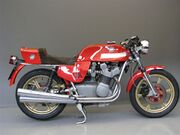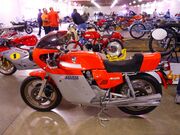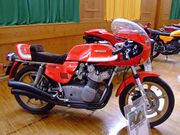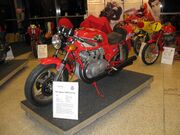Engineering:MV Agusta 750 Sport America
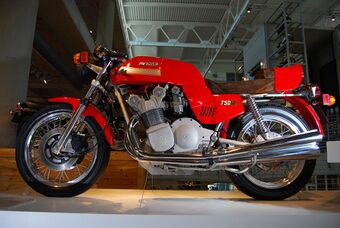 MV Agusta 750 Sport America | |
| Manufacturer | MV Agusta |
|---|---|
| Also called | MV Agusta 750 S America MV Agusta 800 S America |
| Production | 1975 to 1977[1] |
| Predecessor | MV Agusta 750 S |
| Successor | None |
| Class | Sport bike |
| Engine | 789.7cc 4 cylinder DOHC Four 26mm Dell'Orto carburetors[1] |
| Bore / stroke | 67 mm × 56 mm (2.6 in × 2.2 in)[2] |
| Top speed | 210 km/h (130 mph)[1] |
| Power | 75 bhp (56 kW) @ 8,500 rpm[1] |
| Ignition type | Coil |
| Transmission | 5-speed cassette gearbox Shaft drive |
| Frame type | Half-duplex cradle |
| Suspension | Front: Ceriani Teledraulic fork Rear: Swingarm with hydraulic dampers |
| Brakes | Front: double 280 mm disc brakes Rear: 200 mm drum brake (280 mm disc brake from 1976) |
| Wheelbase | 1,390 mm |
| Weight | 240 kg (dry) |
The MV Agusta 750 Sport America (also called MV Agusta 750 S America in Germany , and MV Agusta 800 S America)[3] was a motorcycle manufactured by the MV Agusta company from 1975[4] to 1977. Derivative models were produced in limited numbers until 1982, and the Magni models are still available to special order.[5]
Development
In 1974 MV Agusta suffered financial difficulties and came under state administration. In 1975, Chris Garville and Jim Cotherman of Commerce Overseas Corporation, the US MV importers, initiated the new edition of the MV Agusta 750 S. The appearance should be more closely based on MV's racing machines, with the aim of increasing sales in the US.[6] Within 50 days, the designs of the two entrepreneurs were implemented at the Gallarate plant.[7]
Technical data
The core of the engine was formed by the crankcase rack. In the rack was mounted the nine-piece crankshaft, assembled in six bearing blocks using roller bearings, as well as the spur gears in the control tower for driving the two camshafts. After loosening twelve nuts, the units mounted on the rack could be lifted out.[8] Bore was increased by 2 mm over the 750 S models to increase capacity to 789cc. Individual light alloy cylinders (a block was used on the 1100 Grand Prix model)[9] with cast liners were used with Borgo pistons. The two valves of each cylinder were actuated by bucket tappets from two overhead gear-driven camshafts. Particularly striking was the fine ribbing of the cooling fins on the sump as well as the oversized cylinder head acting by the double camshaft drive.[10] The gearbox was transversely mounted in a cassette. It was connected to the shaft drive to the rear wheel via a spiral bevel gear angle drive.[11] The engine was, like all MV four-cylinder models, assembled by hand.[12]
The diameter of the Ceriani telescopic forks was increased from 35 to 38 mm, and double disc brakes were used on all models. The gear shift was transferred to the left side of the engine. The red livery, the suede-covered seat and the Smiths round instruments made this a sporty and elegant motorcycle.[13]
Model variants
| 800 SS Super America[14] |
800 SS Super Daytona America[15] |
850 SS Monza[16] | |
|---|---|---|---|
| Production | 1975–1978 | 1976–1978 | 1977–1978 |
| Capacity | 789 cc | 789 cc | 837 cc |
| Bore/Stroke | 67 × 56 mm | 67 × 56 mm | 69 × 56 mm |
| Power | 82 bhp (61 kW) @ 9.000 rpm |
90 bhp (67 kW) @ 10.000 rpm |
90 bhp (67 kW) @ 9.000 rpm |
| Secondary drive |
Shaft | Shaft | Shaft |
| Wheelbase | 1420 mm | 1420 mm | 1420 mm |
| Maximum speed |
210 km/h (130 mph) | 235 km/h (146 mph) | |
| Production quantity |
27 |
- MV Agusta 750 Sport America (1975-1977): Basic 789 cc version derived from the MV Agusta 750 S.
- MV Agusta 800 SS Super America (1976-1978): Enhanced version (82 bhp (61 kW) @ 9000 rpm) of the 789 cc base engine for the US market, optionally available with a 4-in-1 Magni exhaust system and magnesium wheels.[17]
- MV Agusta 800 SS Super Daytona America (1976–78): Further increased in performance with a Magni kit, a full fairing was also offered.
- MV Agusta 850 SS Monza or MV Agusta 850 SS Boxer (1977–78):[18] Bore increased to 69 mm to give 837 cc capacity and a Magni Motorkit fitted to give 90 bhp (67 kW) @ 9000 rpm.[19] The full fairing version was not available in Germany. 27 machines of this model were made.[20]
Hansen & Schneider special models
| 900 S Arturo Magni Cento Valli[21] |
1000 S Corona[22] |
1100 Grand Prix[9] |
1000 Agostini[23] | |
|---|---|---|---|---|
| Production | 1977–1978 | 1978–1982 | 1978–1982 | 1979–1980 |
| Capacity | 892 cc | 954 cc | 1066 cc | 954 cc |
| Bore/Stroke | 70 × 58 mm | 70 × 62 mm | 74 × 62 mm | 70 × 62 mm |
| Power | 104 bhp (78 kW) @ 10,000 rpm |
106 bhp (79 kW) @ 10,000 rpm |
118 bhp (88 kW) @ 10,200 rpm |
99 bhp (74 kW) @ 10,200 rpm |
| Secondary drive |
Shaft | Shaft | Shaft | Chain |
| Wheelbase | 1420 mm | 1390 mm | 1450 mm | 1450 mm |
| Maximum speed |
235 km/h (146 mph) | 230 km/h (140 mph) | 237 km/h (147 mph) | 230 km/h (140 mph) |
| Production quantity |
10 | 12 | 6 | 4 |
The importer for Germany, Hansen GmbH[24] in Baden-Baden, arranged the production of special models in 1976 with the consent of the factory. These were "luxury sports machines", and the impression was created that these motorcycles were made more as a kind of hobby than commercial reasons.[25] The displacement was increased over the factory 837 cc. At the same time, the crankshaft was changed, Mahle pistons and sportier camshafts were fitted.
The standard suspension (steering head angle 63 degrees, caster 110 mm) with Ceriani fork front (125 mm travel) and Sebac gas struts rear (70 mm travel) were retained. Only the 1000 Agostini got the Magni frame and was thus nearly 20 kg lighter than a comparable production model. The new models which were officially offered only in Germany, but were available worldwide through Hansen, were:
- 900 S Arturo Magni Cento Valli - The engine was bored and stroked from the 750 Sport America engine to increase capacity to 892 cc.[21]
- 1000 S Corona - The engine stroke was further increased to give a 954 cc capacity.[22]
- 1100 Grand Prix - The bore was increased by 4 mm to give a 1066 cc capacity. This larger bore required a new cylinder block.[9]
- 1000 Agostini - 954 cc capacity. Fitted with chain rear drive[23]
Magni special models
| Magni 832[26] | Magni 861[27] | |
|---|---|---|
| Production | 1978– | 1978– |
| Capacity | 837 cc | 861 cc |
| Bore/Stroke | 69 x 56 mm | 70 x 56 mm |
| Power | 88.5 bhp (66.0 kW) | 95 bhp (71 kW) @ 10,000 rpm |
| Secondary drive | Chain | Chain |
| Maximum speed in km/h |
225 km/h (140 mph) | 230 km/h (140 mph) |
Arturo Magni, former race director of MV Agusta, independently developed motorcycles from the existing MV engines.[24] The Magni kit consisted of an 11 kg lightweight frame, which was based that used on the F750 S Imola racer,[28] electronic ignition and 30 or 32 mm PHF carburetors. The models use a chain for the final drive rather than the more usual shaft drive.[24] Two Magni models were first produced in 1978:[20]
- Magni 832 (Also known as the Magni 850) - engine from the MV Agusta 850 SS Monza.[26]
- Magni 861 - Bore increased by 1 mm to 70 mm, to give 861 cc capacity.[27]
Magni still produce their models to special order.[5]
End of production
With the departure of MV Agusta from racing in 1976, the production of the street models were reduced. Although prototypes were developed until 1977, they were not implemented due to the financial situation of the company - MV made little profit from motorcycles.[29] The production of the model MV Agusta 750 S America was maintained until 1978. The last of the 540 machines made were sold officially 1980. A total of 1276 four-cylinder machines were produced from 1966 to 1980.[30]
Gallery
References
- ↑ 1.0 1.1 1.2 1.3 "Classic MV Agusta - 1975 MV Agusta 750S America". The Bike Museum. http://thebikemuseum.com/master_view.php?id=12&MV%20Agusta&750S%20America.
- ↑ Falloon 2011, p. 167.
- ↑ Schwab 1987, p. 63.
- ↑ Gingerelli, Michels & Everitt 2011, p. 225.
- ↑ 5.0 5.1 "Original MV Agusta 4-cylinder motorcycle" (in it). http://www.magni.it/mv_04.htm.
- ↑ Branch, Ben (7 December 2017). "The Rare MV Agusta 750S America". https://silodrome.com/mv-agusta-750s-america-motorbike.
- ↑ Motorrad 5/2003 p.14
- ↑ "Geniestreich 4 Zylinder Motor". Motorrad. 11 July 1979. http://www.mv-agusta-club-schweiz.ch/Geniestreich%204%20Zylinder%20Motor.html.
- ↑ 9.0 9.1 9.2 "Classic MV Agusta - 1978 MV Agusta - Hansen 1100 Grand Prix". The Bike Museum. http://thebikemuseum.com/master_view.php?id=5&MV%20Agusta%20-%20Hansen&1100%20Grand%20Prix.
- ↑ American Motorcyclist 2001, p. 87.
- ↑ Colombo, Grizzi & Patrignani 2016, p. 87.
- ↑ Colombo, Grizzi & Patrignani 2016, p. 36.
- ↑ Motorrad 5/2003 p.17
- ↑ "Classic MV Agusta - 1977 MV Agusta 800 S Super America". The Bike Museum. http://thebikemuseum.com/master_view.php?id=26&MV%20Agusta&800%20S%20Super%20America.
- ↑ "Classic MV Agusta - 1977 MV Agusta 800 SS Super America". The Bike Museum. http://thebikemuseum.com/master_view.php?id=20&MV%20Agusta&800%20SS%20Super%20America.
- ↑ "Classic MV Agusta - 1977 MV Agusta 850SS Monza Boxer". The Bike Museum. http://thebikemuseum.com/master_view.php?id=16&MV%20Agusta&850SS%20Monza%20Boxer.
- ↑ "Quadrophonie". Motorrad (14): 6–10. 1997. http://thebikemuseum.com/master_docs.php?id=126.
- ↑ "Classic MV Agusta - MV Agusta 850SS Monza Boxer". The Bike Museum. http://thebikemuseum.com/master_view.php?id=16&MV%20Agusta&850SS%20Monza%20Boxer.
- ↑ "Boxer Tricks". The Bike Museum. http://thebikemuseum.com/master_docs.php?id=147.
- ↑ 20.0 20.1 "Herstellerübersicht". MV Augusta Club. http://www.mv-agusta-club.de/MV%20Agusta/Modelle/Modelle.aspx.
- ↑ 21.0 21.1 "Classic MV Agusta - 1977 MV Agusta - Hansen 900 S Arturo Magni - Cento Valli". The Bike Museum. http://thebikemuseum.com/master_view.php?id=18&MV%20Agusta%20-%20Hansen&900%20S%20Arturo%20Magni%20-%20Cento%20Valli.
- ↑ 22.0 22.1 "Classic MV Agusta - 1978 MV Agusta - Hansen 1000S Corona". The Bike Museum. http://thebikemuseum.com/master_view.php?id=4&MV%20Agusta%20-%20Hansen&1000S%20Corona.
- ↑ 23.0 23.1 "Classic MV Agusta - 1980 MV Agusta - Hansen 1000 Agostini". The Bike Museum. http://thebikemuseum.com/master_view.php?id=3&MV%20Agusta%20-%20Hansen&1000%20Agostini.
- ↑ 24.0 24.1 24.2 "Classic MV Agusta". The Bike Museum. http://thebikemuseum.com/.
- ↑ Tragatsch 2000, p. 123.
- ↑ 26.0 26.1 "Classic MV Agusta - 1984 MV Magni 832 or 850". The Bike Museum. http://thebikemuseum.com/master_view.php?id=21&MV%20Magni&832%20or%20850.
- ↑ 27.0 27.1 "Classic MV Agusta - Magni 861 S Arturo Magni". The Bike Museum. http://thebikemuseum.com/master_view.php?id=17&MV%20Magni&861%20S%20Arturo%20Magni.
- ↑ Falloon 2011, p. 207.
- ↑ Colombo, Grizzi & Patrignani 2016, pp. 39-41.
- ↑ Motorrad 5/2003 p.21
Bibliography
- "Classics - 1975 MV Agusta 750 Sport America" (in en). American Motorcyclist (American Motorcyclist Assoc). June 2001. ISSN 0277-9358. https://books.google.com/books?id=FPsDAAAAMBAJ&q=mv+750+sport&pg=PA87.
- Colombo, Mario; Grizzi, Otto; Patrignani, Roberto (2016) (in en). MV Agusta: From 1945 to the present. Giorgio Nada Editore Srl. ISBN 9788879116176.
- Falloon, Ian (2011) (in en). The Book of the Classic MV Agusta Fours. Veloce Publishing Ltd. ISBN 9781845842031. https://books.google.com/books?id=EYenSvosifUC&q=mv+750+sport.
- Gingerelli, Dain; Michels, James; Everitt, Charles (2011) (in en). 365 Motorcycles You Must Ride. Motorbooks. ISBN 9780760334744. https://books.google.com/books?id=Kabox9JS1OEC&q=mv+750+america&pg=PA225.
- Schwab, Ulrich (1987) (in de). Motorräder : 1970-1987 ; Typen, Daten u. Preise in Deutschland (1. Aufl ed.). Motorbuch-Verlag. ISBN 9783613011724.
- Tragatsch, Erwin (2000) (in de). Berühmte Motorräder (Spezialausg ed.). Motorbuch-Verl. ISBN 9783613020382.
 |
